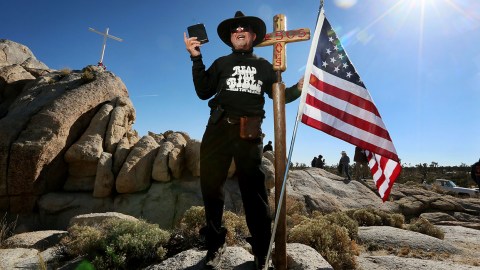Will Church and State Ever Truly Be Separate?

With so much of our attention being paid to one candidate’s Twitter account, many other stories that would normally receive notice have slipped through the cracks. This includes the announcement of the GOP platform, in which Republicans pontificated on the most pressing issues facing America today.
It opens, as expected from any party, with the idea that America is the most blessed nation that Earth has ever witnessed, and it therefore requires extensive resources to fight perpetual scourges—like pornography. Culture wars dominate—for example, marriage must remain “between one man and one woman.” One of the more frightening modifications involves repealing a half-century old tax law that prohibits religious institutions from organizing politically, otherwise known as the Johnson Amendment.
In 1954 Senator Lyndon B Johnson put forward this bill to ensure that tax-exempt organizations cannot endorse political candidates. While this also means nonprofit companies, the GOP slid this item into the section on Religious Liberty. The only nonprofit citations were for religious universities and organizations.
The specific passage begins by parsing pro-religion sentiments from George Washington and Thomas Jefferson, immediately pivoting to claim that religion—well, let’s be clear: Christianity—is under attack:
Ongoing attempts to compel individuals, businesses, and institutions of faith to transgress their beliefs are part of a misguided effort to undermine religion and drive it from the public square.
Somehow this translates as charitable religious organizations being unable to receive governmental grants and contracts due to a liberal Democratic agenda to do away with faith altogether. Certain politicians are apparently threatening religious universities with ‘massive fines’ while seeking to ‘control their personnel decisions.’ Ultimately this will result in a loss of tax-exempt status if the faithful don’t step up their game. The suspension of logic in this singular paragraph, line by line, is astounding. It ends:
Republicans believe the federal government, specifically the IRS, is constitutionally prohibited from policing or censoring speech based on religious convictions or beliefs, and therefore we urge the repeal of the Johnson Amendment.
From there it pivots to imply religious institutions that refuse to marry members of the LBGT community are truly oppressed, as are those choosing to celebrate our nation’s ‘Judeo-Christian heritage.’ School prayer is slipped in, as are businesses that decide not to serve gay customers.
Even in all this noise the repeal of the Johnson Amendment remains the most frightening prospect. As I wrote on this site some time ago, taxing churches would result in a gain of $71 billion in revenue every year. While Johnson specifically cites the IRS in overseeing nonprofit and religious organizations that are politically organizing, this is largely overlooked—religious leaders regularly endorse without actually endorsing. And then some just go ahead and endorse, using their pulpit to influence congregations across the country.
For example, Liberty University’s president, Jerry Falwell Jr, had no problem making an endorsement, even though his school is nonprofit and religious. Megachurch leader Robert Jeffress chimed in, as did fellow megachurch titan John Hagee. At the moment none of these churches appear to be in any danger of losing their tax-exempt status. This is not limited to the GOP—church leaders support Democratic candidates as well. It just so happens that during this election cycle they have not been as loud about it.
Repealing the Johnson Amendment would only make more blatant what is already occurring in the open. To confuse individual liberties with so-called religious liberties is to misunderstand (or simply ignore) the freedoms guaranteed to us. The agenda proposed here has nothing to do with freedom; it’s about mobilizing a particular subset of the American population for votes, plain and simple.
Using houses of worship for political purposes is in no way new, and will continue, mostly unregulated, for the foreseeable future. Dismantling the one protection citizens have against the marriage of church and state—incredibly, often between men and men—is one of the most unconstitutional items on the menu. Perhaps Khizr Khan needs to purchase more pocket Constitutions to hand out to members of Congress. They might consider skimming over it.
—
Derek Beres is working on his new book, Whole Motion: Training Your Brain and Body For Optimal Health (Carrel/Skyhorse, Spring 2017). He is based in Los Angeles. Stay in touch @derekberes.





